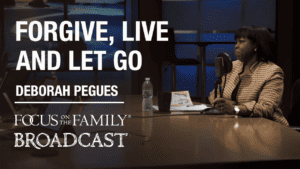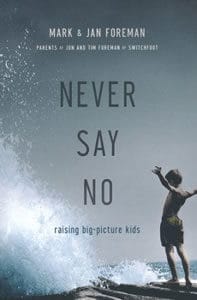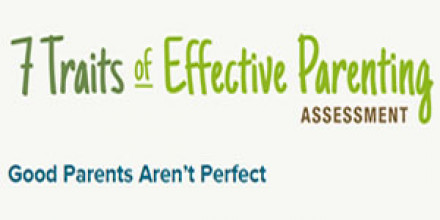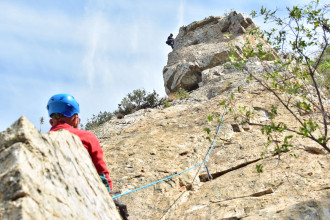Excerpt:
Mark Foreman: You cannot drive with the brakes on.
Jim Daly: (Laughing) Yeah, right.
Mark: You gotta have an accelerator and we have to ask ourselves, “What’s the higher purpose?” And that’s really what we did; what is the higher purpose of raising children?
End of Excerpt
John Fuller: Well, that’s Pastor Mark Foreman and you’ll hear more from him and his wife, Jan today, as they talk about raising what they call “big-picture kids,” who love God and make an impact on the world. They’re our guests on “Focus on the Family” and your host is Focus president and author, Jim Daly. Thanks for joining us. I’m John Fuller.
Jim: Hey, John, last time we heard about the importance of saying yes to our children and I try to do that. Sometimes it’s tough and sometimes it’s hard to distinguish between, you know, what’s a boundary that deserves a “no”? And then what’s a relational thing that should be a “yes”? And if you missed last time, get the CD or the download and certainly, get the book, Never Say No.
And we’re gonna talk more about that today with our guests. But it is going to open up your parenting experience, especially as a believer in Christ.
John: And Mark is a pastor in San Diego. He and Jan have two children, John and Tim Foreman. They’re in the musical group Switchfoot and the book that kinda forms the basis for our conversation, that Mark and Jan wrote, is called Never Say No: Raising Big-Picture Kids.
Jim: Mark and Jan, welcome back to Focus on the Family.
Jan Foreman and Mark: Thank you.
Mark: Good to be here again.
Jim: I loved the conversation last time, because I’m always thinking, am I in the right spot as a parent and am I doing the right thing to help my kids grow spiritually first and foremost? And you know, Jan, last time you talked about life being kinda like a deck of cards and I want to start there again, because we kinda went by that pretty quick. But what did you mean by that?
Jan: Well, every parent gets a deck of parenting cards from their family of origin and we will automatically parent the way we were parented. So, in my mind I see three piles. One pile is a keeper pile for those great things that we want to bring into our own families. But then there’s always a discard pile, where we have heard our mother’s voice coming through us and we’re … we’re doing exactly the same things. It can be even subtle stuff, but it has a different flavor, but it is our mother or father coming through and we definitely want to discard that and do life differently.
And then there’s a rewrite pile, where we have… we kinda want to nurture our kids in that direction, but we want to also do it our own way, not to say, your family wins. My family wins. But it’s find the new “us.” What does that look like?
And I remember one time we went to Mount Rushmore and the thing that surprised us most were [sic] all the pictures of family reunions dressed identically in T-shirts that has (Laughter) some motto on the T-shirt. And I thought, you know, they were hoping their kids would play off this picture and aspire to be great leaders. But I thought, the real story’s gonna be told by the motto on those T-shirts.
And in the same way, we inherit from our families or origin mottos, expressions, ways of doing things.
Jim: Huh.
Jan: These … these could be like—
Jim: Bumper stickers.
Jan: –a bumper sticker–
Jim: Yeah.
Jan: –a plaque that could hang over your mantle. In my family it was, “What would people think?” And I lived under the shadow of that. So that’s something very specific that I caught myself doing to my kids, especially in a ministry family–
Jim: Yeah.
Jan: –saying, “I absolutely am not gonna care what people think.” And … and to convey—
Mark: And so, she actually—
Jan: –that message–
Mark: –let Tim—
Jan: –to my kids.
Mark: –wear your soc … his soccer uniform with cleats to church.
Jim: His soccer uniform.
Jan: To church.
Mark: Yeah, yeah.
Jim: Now you’re the pastor of this church.
Mark: Right.
Jim: How did that make you feel?
Mark: Oh, I … well, I didn’t … wasn’t raised in the church, so I was fine with that (Laughter) actually.
Jim: You weren’t apprehensive about it.
Jan and Mark: No.
Jim: You weren’t feeling like you need to—
Mark: No, there was—
Jim: –put on [a mask].
Mark: –no performance.
Jim: Yeah.
Mark: But then go ahead.
Jan: But just … you know, you can take those mottos and create a new motto. And so, in our minds, we could flip that around and say, “I want you to be the person God made you to be. Who cares what people think?” I had to kind of be an iconoclast against that strong pressure that I was raised under in my family. And in Mark’s family, we you can talk about teasing as being—
Mark: Yeah.
Jan: –more the motto in his family—
Mark: If you—
Jan: –of origin.
Mark: –if you love someone, you tease them.
Jim: Right.
Mark: If you really loved ‘em, you’d tease them to tears. And you know, it takes a long time. I think it took me till I was 42 to think of that in love language out, like, oh, wow, [they] really loved me. Or if you really love someone, you just work really hard and stay away from home working and making money for the family.
Jim: Man, that’s so good, Mark. I’m tellin’ ya, this morning I was on the sofa. I got up early. I was on the treadmill. This is, you know, a new start (Laughing) and … and my youngest came down and we sat down and over … over a break not long ago. I was talkin’ about eating as many carbs, you know, maybe he should cut back on the carbs. And I apologized to him this morning and sayin’, “No, Troy, that wasn’t wise of me.”
Mark: Yeah.
Jim: You are … you’re in the right direction. You haven’t even hit your full growth spurt.
Mark: Yeah.
Jim: You know, you’re doin’ great. I had to catch myself, but I needed to let him know it was wrong for me to comment on that.
Mark: Yeah.
Jim: That’s hard to do for parents, isn’t it?
Mark: It is. It is. Because you’re in that rut. My dad was a, you know, post World War II guy, so the way you love your family is you just work hard and then when you’re … when you’re home, you’re off duty. You watch football.
Jim: (Laughing) Oh, now you’re hurtin’ me.
Mark: Yeah and … and so, I was lookin’ for a dad that would interact, and we’d spend time and do stuff together and … and stuff. And … and I love my dad dearly. He’s 90; he’s just … and we spend great times together now. But it was kind of the “Cats in the Cradle” kind of home. We’ll get together then, son; we’re gonna get together then.
And so, when I saw myself starting to do that with my sons at a very early age, only now for God and for ministry, and working 70-hour work weeks, you know, I had a moment where I felt God ask me, “How will you feel if you win 5,000 people to heaven and lose your own children?” Because you’re playing Harry Chapin’s song and I said, “I’m gonna reverse that song. I’m gonna get together with my kids now, not then.
Jim: Yeah, that’s heartfelt and you know, so many of us as dads, I mean, we’re feelin’ that…
Mark: Yeah.
Jim: … because we’re sayin’, well, next time or later or—
Mark: Yeah.
Jim: –you know, we’ll play catch on–
Mark: But then you don’t—
Jim: –another day.
Mark: –know how to do it because you haven’t. So, what do I do? So, I came ac … upon a great book that really saved the day, Ross Campbell’s How to Really Love Your Child. And he talks about a love tank. And when your child’s love tank is full, behavior problems are down. When behavior problems are up, love tank is low. So, I wanted to know how to fill this love tank.
Jim: Yeah.
Mark: ‘Cause this was gonna reverse the Harry Chapin story and that was miraculous for me.
Jim: Yeah.
Mark: So, I discovered for my boys it’s high touch, high eye contact and high time would fill their love tank.
Jim: High time, yeah.
Mark: Yeah.
Jim: Give them lots of your time.
Mark: So, the way I did it when they were young was wrestling.
Jim: Yeah. (Laughing)
Mark: We would wrestle half an hour to 60 minutes a day before dinner. We’d, you know, God was very gracious to us, gave us a wife that … my wife that put up with a lot of sweaty bodies (Laughter) at the table. When they were older, it was playing soccer and
football together and one … later on, it was playing music and surfing together. And …
Jim: So, active.
Mark: Yeah, spending time, hanging out.
Jim: Let me ask you though, the issue of failure. You know, again, I think one of the things that we struggle with as Christian parents is our kids failing. And hopefully, if you’re doing this well in the early years, you’re letting them experience that failure, so you can come alongside to instruct them and you used that analogy last time about your boys right at the end of the program, listening to music that frightened you, because that’s what you listened to before you became a Christian. And … and somehow, we’ve gotta create an environment where failure’s okay.
Mark: Yeah.
Jim: And I don’t think and I … for myself, I mean, I struggle with my boys being able to give them that kind of space. How do we recalibrate as a parent to say, okay, try?
Mark: We … we do it incrementally. You know, I think the idea that we’re gonna raise our kids and then turn them loose on the world when they’re 28—
Jim: All ready to go.
Mark: –yeah, it’s—
Jim: Clean, neat and gassed.
Mark: –that … that’s just not gonna happen. Incrementally we increase their freedoms, which increases their risk of failure, but it also increases their responsibility and their success. Just like taking training wheels off of a bike and there’s a chance of the child falling over.
Jim: Okay now, if I can get practical with that, your two boys who are in, you know, Switchfoot, this very successful band, how did you do that with them in their teen years? I mean, how did you take the training wheels off, let them explore things that you know, as a pastor’s family, man, they must have been pushin’ the boundaries a little bit.
Mark: One time that comes to my mind, we were living in Virginia Beach and John was taking up surfing. And John has just got this magnanimous heart. He’s just gonna go out and conquer the world. But you know, it was a Nor’easter that … it was winter time.
Jim: A bad storm.
Mark: Yeah, a bad … the water was 48 degrees. And he has this wet suit that’s too big, you know and he’s gonna go out. And I had to make the decision. Am I gonna let him do this, you know? And you have those calls where you think, I’m not sure I’m doin’ the right thing, but I think … I think I can save him if he starts drowning, but I’m gonna let him do this. This is increased freedom. His heart’s good and he’s a strong swimmer. He’s gonna paddle out and he’s gonna paddle back in in 45 minutes.
And … well, he stayed out for an hour and a half. He had a ball. There was a victory in him. There was a confidence that when he came in, it is like he had had a conversation with the ocean and he said, “I’m onto you.” (Laughter) And … and …
Jim: I’ve mastered you.
Mark: Yeah or respect you, at least. So, it’s those kind of things that … but I think that we were doing it together, that it made it something that was both safe, but at the same time, increasing who he was becoming.
Jim: Assured his confidence.
John: This is Focus on the Family and our guests today are Mark and Jan Foreman. Two of their boys are in the popular band, Switchfoot. And you can find Mark and Jan’s great book, Never Say No, and a CD of this conversation, or a download, at focusonfamily.com/broadcast. Or call 800, the letter A, and the word FAMILY.
Let’s go ahead and continue now with Mark and Jan Foreman.
Jim: Hey, Mark and Jan, let me ask you this. For the parents who have teens, maybe in the mid-teens, you know, the 15-year-old,16-year-old, and they’re goin’, wow! This has not been the methodology. It’s been about the boundaries, about the rules. I’ve said no too much. What can they do to kind of begin to recover the relationship with their later teen children?
Mark: I would take ‘em to the edge of themselves.
Jim: What does that mean?
Mark: I would find something that you could do with your child, whether it be taking them to feed the homeless, taking them to a dump in Nicaragua, taking them to India, to Cambodia.
Jim: Inner city in the U.S.
Mark: Inner city U.S. and let them participate in a great Christian ministry that’s going on, and they’re everywhere, to see somebody making a difference. That this is why you pray. This is why you study your Bible. This is why you go to church. That’s all locker room stuff, so that we can take the field and play a big game. I would do that with them.
Jan: And I think a lot happens relationally. It’s what they observe in us as we reach out to our neighbors and have folks in our home that have different viewpoints and conversations. We try to erase the boundary line between the secular and the sacred. Where we wanted our kids to not really know the difference. To have the ability to be a good friend to someone who was going to the New Age fellowship down the street, as good a friend as they could be to the kid who was … they were raised in Sunday school together, as they could to the guy who stopped by their dorm room in college and was an atheist.
We wanted them to be really good at friendships, because I think that’s how God shares His Good News is through friendship.
Jim: I so appreciate that, because I think one of the skills that we’re lacking in now is the art of discipleship, which is really what you’re describing there, that you can walk with another person, regardless of their current state of mind, their current spiritual perspective. But you can walk with them and be the influence that they … they need and may not even realize. And hopefully, that over a period of time, the Lord uses that to open that person’s heart up to the Gospel. We … we’re not as good at that as I think the Church once was. Is that a fair statement, Mark?
Mark: Yeah and I think it’s never too late.
Jim: No.
Mark: I really don’t. I think I would love to, you know, have my sons be impressed with me today. I … but it’s never too late to decide, hey, kids, I did it wrong. Or I want to make an alteration here. You know, it … it’s halftime and … and we’re gonna make an alteration and I’m gonna start with me. I’m not gonna ask you to do something. It will start with me.
And I’m actually gonna go do this in the inner city and would love for you to come along. And that … that’s bold, ‘cause they’re seeing someone in mid-life taking ahold of truth and changing, and its effect; that’s bold.
John: Jan, I’m still … and that’s a good statement. I appreciate that, Mark. I’m still thinking about your comment about erasing the lines between the sacred and the secular. Practically, what did that mean? I mean, how did … how did you help your kids do that, especially I think, Jim, you mentioned earlier, the fishbowl. You’re the pastor’s family, so you better be livin’ it right for everybody else in the congregation.
Jan: I think we were fortunate that we pastor churches that, first of all, did not put any different expectations on our kids. And if someone wa … came along and made some inappropriate statement, we would right then and there say that was not a fair statement. You know, my child can be whoever they want to be. Don’t call them a PK or whatever.
Jim: Right.
Jan: But I also think it was the day-to-day lifestyle, again where they saw us having just as many friends within the community, within the soccer community, the YMCA, having friends and neighbors over. We didn’t live in a fishbowl. We lived out in the community and we’re just as happy to volunteer to read essays for the public school as we were to teach a Bible study ever since they …
John: All church-based life.
Jan: No. We tried to have that balance where it was, yes, church is important. You need to be with God’s people, but you also need to be where Jesus was. Frankly, He was in the community with real people.
Mark: We have found that labels can often be a hindrance. They’re Christian. They’re not. Well, you and I know that there’s all kinds of Christians.
Jim: Sure.
Mark: And there’s all kinds of unbelievers that are on their journey to truth. And so, labels and files end up being a hindrance. And so, we tried not to use those kind of labels. We tried really hard to treat people as people. And I think they … they saw some of that.
Jim: Well, and it’s a wonderful messy place to be.
Jan: Uh-hm.
Jim: But the difficulty in that is I think again, our tidiness appetite to kind of create the castle, build the moat, create a sterilized world for us to live in, is really far from the Gospel.
Mark: And in the end, it’s not safe–
Jim: Right.
Mark: –because when they walk away from the Lord, because they didn’t see the relevance of it, how was that safe?
Jim: And that’s where, you know, generally again, our parenting approach, it’s dangerous to create the moat around that castle, rather than the bridge, to go out and to engage a culture, to teach the children as they’re growing in age-appropriate ways, to talk to the friends. I love that. It’s one of the reasons Jean and I, and this is a very controversial thing. I know education for the kids is controversial and we have lots of wonderful homeschooling households that listen to Focus and I respect that. But we had a good option here in Colorado Springs with a charter public school that is a good school. And they’ve got good oversight, great teachers and good students that attend, with all the right kind of boundaries. And we chose to put our kids in that environment. And you know, do we second guess that at times? Occasionally, but I love the idea of messy.
Mark: Yeah.,
Jim: Kids have got to learn to operate in a world that doesn’t always think the way they think. And if our goal is simply to … to get our kids thinking alike and not experiencing other children and what they think, we’re in trouble, aren’t we?
Mark: Yeah.
Jan: Uh-hm. Yeah.
Jim: And you know, I want to say another thing about dreams. You know, we have dreams for our kids. I mean, I played football and so, for my boys (Laughing), I had to always bite my lip, ‘cause I’m thinking, okay, are they gonna play football? Do they want to play football? I know some parents are going, no, don’t let ‘em play, concussions, you know. I get that. I get all of that and it … it’s fair. It’s a fair criticism or critique. But at the same time as an athletic dad, I’ve gotta also let them live their dream—
Mark: Yeah.
Jim: –and pull back from that–
Mark: Oh, that is so hard.
Jim: –it is so hard–
Mark: Oh.
Jim: –and kinda let them, you know, explore the world and become what they want to become. Did you have that, as parents, as well, that kinda uh! They’re not doing exactly what I would want them to do.
Jan: I think expectations can be a real dream killer, when parents—
Jim: A dream killer, yeah.
Jan: –try to live their lives through their kids. You really do need to take your cues from them, what their interests are. Are they mechanically minded? Are they unusually social? Do they love the arts?
Jim: Well, your boys dropped out of college. That would be another—
Jan: That—
Jim: –one for me—
Jan: –was—
Mark: Oh.
Jim: –where I’d be going, “Whoa, whoa—
Jan: –hard.
Jim: –whoa!”
Mark: I need … my whole world is academia and—
Jim: You’re a Ph.D.
Mark: –yeah and … and they’re much brighter than I. So, in fact, many people don’t know that John had aspirations of getting his Ph.D. in economics.
Jim: Oh, my goodness.
Mark: And um, so, he’s been a senior for 20 years now. (Laughing) Tim’s a sophomore at … at a very prestigious UCSD, hard to get into—
Jim: Yeah.
Mark: –academically. But it starts much earlier. It’s … it’s when they stopped playing soccer to be on the varsity surf team.
Jim: How did you manage that?
Mark: Oh, I … I fought. I said, “You know, I thought you might get a scholarship here and
I don’t know how many surf scholarships are out there.” And we negotiated that and finally, I gave in. When they … when they wanted to pursue the music career, I … I fought particularly with Tim. I said, you know, “Please, while you’re recording the second album, can you fly back from Nashville and take these courses?” And because I wasn’t sure. I didn’t want ‘em to put all their eggs in this basket. Finally, now, I joke that some people have their career first and then they go to school.
Jim: Well, that’s … a lot of athletes are in that—
Mark: But … but the—
Jim: –boat.
Mark: –they … they educate themselves. They read books. They’re … they’re brilliant.
Jim: Can I ask you though? That negotiation and I really, I mean this from a dad to a dad. How do you do that without hurting the relationship? What kind of attitude do you bring into that to make sure when it’s over, win or lose—
Mark: Yeah.
Jim: –you still have relationship with that son or daughter?
Mark: Wow, well, I … I would say it’s a three-legged stool and one of the legs is, okay, I’ve gotta stay close. When this thing is said and done, we gotta be buds. I think one of the stools is dreams. I want to be the guy that encourages your dream or is it one of the legs? You know, that polishes your dreams and your hopes. But I’m also gonna be that Dutch uncle. (Laughter)
John: Meaning?
Mark: Meaning, what’s Plan B?
John: Yeah, right. (Laughter)
Jim: How are you gonna pay the bills?
Mark: Yeah and … and—
John: Yeah.
Mark: –‘cause that’s the real world so, when …
Jim: And it’s okay to do that.
Mark: Yeah.
Jim: Just don’t be too overbearing.
Mark: So, let’s have the relationship. Let’s have the dream. And let’s talk practicality. And I’m gonna walk with you in this and we’ll see—
Jim: Ah, that’s good.
Mark: –what happens.
Jim: Ah, that’s good.
Jim: We are out of time and I have so enjoyed the opportunity to get to know you. And even as I was getting ready for the program, you know, I’m thinking of your boys and the success that they have had with Switchfoot. And I wanted to ask you perhaps a very blunt question. Your kids have been really successful. But speak to that parent that maybe they have the underachiever. They’re not seeing the kids show signs that they want to aim high. It’s temperament. It’s a whole … a whole batch of stuff that’s come together to create that in my opinion. But speak to that parent who feels like maybe they got the C student and he doesn’t know how to play music.
Mark: Yeah.
Jim: And he’s not gonna be a leader. They’re just seeing the signs of it. What can they do…?
Mark: Yeah.
Jim: … to say, “Okay. What are we gonna do with our son or daughter?”
Jan: I think every child is here for a purpose. This gets back to John almost drowning. Every child has a calling on their life. And it may not be some of the more obvious niches that our … our culture defines as success. It may be that they are skilled, you know, relationally and they have a compassionate heart. It may be that they, you know, they love school or they… They have a bent and as a parent, hopefully, you’ve been picking up clues all along.
So, I always thought by the time you hit your, you know, tweens or even early teens, you would have helped your child find what their passion is. Everybody has a passion. I just don’t believe there’s a child out there that flat and mediocre about—
Jim: You just haven’t—
Jan: –life.
Jim: –sparked it.
Jan: We haven’t sparked it. We haven’t made those connections. I think that’s why it’s important to expose your kids to as many things as possible. You don’t know what’s gonna stick. Maybe they’re interested in that ‘cause their buddy was, but it’s really not their heart or their gifting.
But I really, really believe that within every child is a calling of God in their life. So, I would say, just continue to walk with them in some of the more unusual venues to help them find what it is that God has put them here on this earth for.
John: Hm. Some really profound truth to conclude our two-part conversation with Mark and Jan Foreman on Focus on the Family.
Jim: Uh, John, I love Mark and Jan’s advice about dreaming with our kids, instead of for them. I resonate with that. It really helps our kids to find their God-given purpose.
And if you’re feeling inspired to adjust your own approach to parenting, head over to our website and take our “7 Traits of Effective Parenting” assessment. This was developed by our experts here at Focus on the Family and is designed to show you your strengths, along with the areas for growth, in your relationship with your children.
John: You can find that assessment, and take it, at focusonthefamily.com/broadcast.
Jim: I also highly recommend you get a copy of the Foremans’ book, Never Say No: Raising Big Picture Kids. We barely skimmed the surface of this content today.
And if you’d be willing to partner with our ministry here at Focus and give a gift of any amount, I want to send you a copy of the book as our way of saying thank you.
In the past year, get this John, because of those who are supporting Focus, we were able to help more than 519 thousand parents prepare for the major transitional stages of their child’s life.
John: That’s awesome.
Jim: You can help us and help even more parents in 2020! So please, consider becoming a monthly sustainer today, or even a one-time gift, and I’ll get that copy of Never Say No into your hands.
John: You can donate and get the Foreman’s book at focusonthefamily.com/broadcast. Or when you call, 800, the letter A, and the word FAMILY.
Well, have a great weekend with your family, and your church family, too. And be sure to join us on Monday as we hear what to do when your kids ask those difficult questions about life, about God, about the bible.
Teaser:
Mrs. Natasha Crain: Well, if your kids ask you questions you can’t answer, that’s actually a great thing. It means that they’re asking questions, right? And a lot of kids don’t even want to ask the questions to begin with. So, it’s great if your kids are asking questions. But if you don’t know how to answer the question, then say “I’m so glad you’re asking this. Let’s talk about how to find out an answer together. A biblically sound answer.”


















